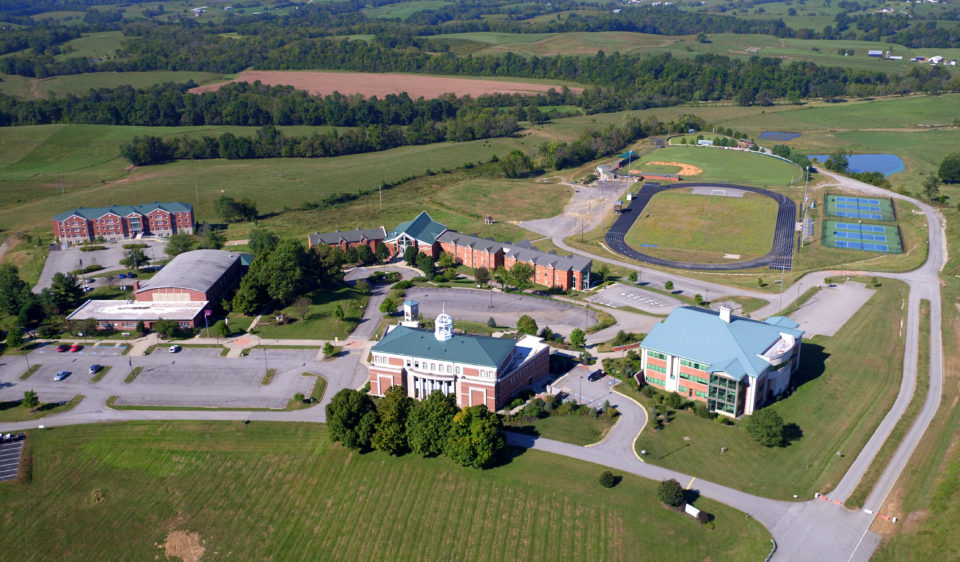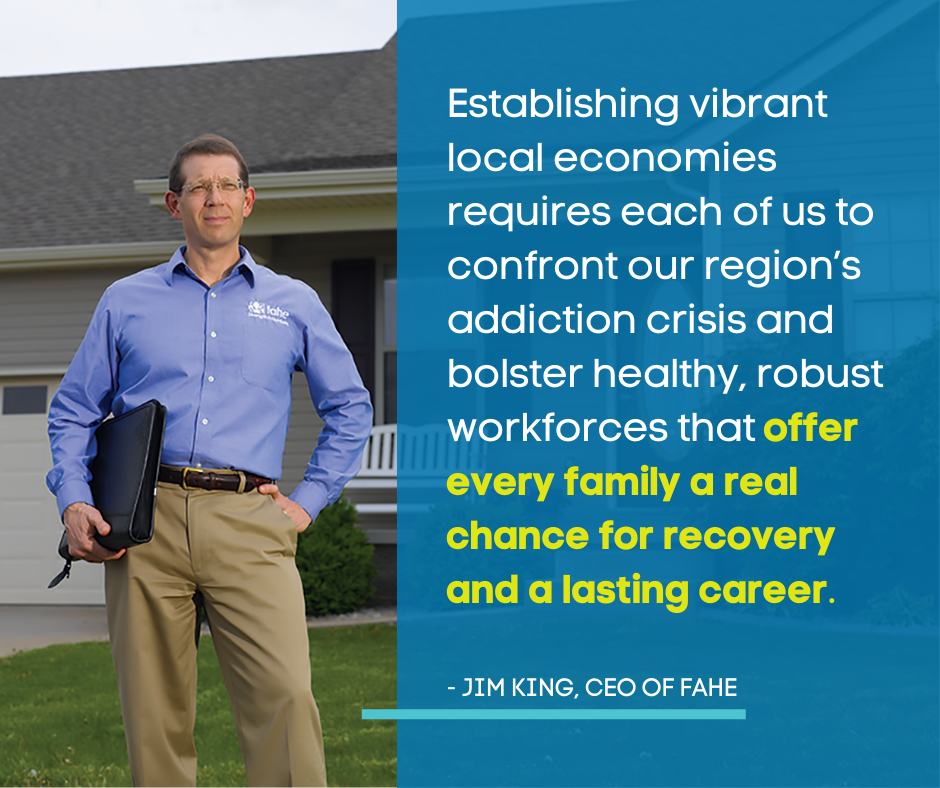
From College Campus to Kentucky’s Largest Recovery Center—Finding New Purpose in Second Chances

As Crown Recovery Center Opens, Fahe is Building Renewed Opportunity for More Than Just Vacant Classrooms
It was a discouraging day in 2016 when Washington County, Kentucky lost one of its most treasured local institutions. After serving students in the region for more than 80 years, St. Catharine College, a small Catholic liberal arts school near Springfield, was forced to permanently shutter its doors. The closure not only impacted the college’s 750-plus students, but also the staff, faculty, and surrounding residents who relied on its contributions to their community’s economy.
While the campus sat vacant for the ensuing years, Fahe and a coalition of addiction treatment specialists and community development experts saw an opportunity. In 2020, it was announced that the site would be converted into the Crown Recovery Center, and it has since served as the region’s up-and-coming epicenter for comprehensive addiction treatment and local economic revitalization.
The project was first envisioned and proposed by Addiction Recovery Care’s CEO, Tim Robinson, along with local developers and stakeholders like Art Walker and District Magistrate John Graves. ARC is a Kentucky-based addiction treatment provider that specializes in both outpatient and inpatient treatment options. It owns and operates more than 30 licensed addiction treatment centers across 16 eastern, central, and northern Kentucky counties and has helped offer solutions for both families and local leaders in search of innovative medical and therapeutic approaches to combat the rise in substance use disorders.
Conversations between Fahe and Addiction Recovery Center continued from 2018 into 2019. A loan from Fahe for $4.95 million was approved at the end of February 2019, and construction was able to begin on the more than 50 acre sprawling campus. After a second loan, Fahe’s total investment sat at roughly $5.95 million. Major renovations were needed to convert the existing buildings into a functional residential recovery facility, and after several months of retrofitting, rehabs, and repairs, the facility began to accept its first clients.
Today, the Crown Recovery Center is Kentucky’s largest and most comprehensive treatment center. The residential center currently serves about 450 men and women, and eventually it will be able to serve more than 700 total clients. The services offered include medically-assisted inpatient and outpatient treatment. As their clients work on their physical and mental health, they also receive vocational rehabilitation and job training.
As part of ARC’s comprehensive course of treatment and recovery, their clients undergo a four-phase program in this self-contained facility, starting with a 30 day intake process. As they continue through the program, clients participate in one-on-one therapies and group counseling. They learn about personal finances and self-care in addition to receiving medical and dental attention. Then, after demonstrating solid progress in their recovery, the program gradually shifts to a greater focus on workforce training. In preparation for their return to general society and the workforce, many assume increased responsibilities within the program, even becoming peer-mentors to newer clients. In fact, many staff members in the facility have, themselves, been through addiction recovery programs, and there is a strong culture of modeling successful second-chance employment opportunities and building self-confidence for life and career possibilities after recovery.
Dwain Neeley, Fahe’s Vice President of Community Lending, had the opportunity to visit the campus in Springfield earlier this year. He described the recovery center as looking and feeling like an educational environment, reminiscent of its roots as a college campus. He recalls seeing clients walking with backpacks between classes and sitting on campus greenways enjoying outdoor camaraderie during group therapy sessions. Neeley noted many residents of the facility approached him to express their gratitude for the program, relating how it had changed their lives. “A lot of people told me, ‘I had nothing, then I got into this program,’” Neeley explained. These same sentiments were echoed just a few weeks later at Crown’s inaugural ribbon cutting ceremony, with countless clients expressing their gratitude for the program and detailing their hopes for the future. For its part, ARC expects to host its first celebration ceremony for this first cohort of program graduates in May of 2022.
Moreover, the new Crown Recovery Center promises to revitalize the surrounding region with more than just healthier families and happier, sober workforces. When St. Catharine College closed in 2016, the local community abruptly lost around 250 jobs. Upon opening its new campus, ARC has brought back around 200 of those jobs, and it hopes to eventually provide about 375 total new employment opportunities for the local community.
The promise of job-generating investment in the community and life-changing treatment for addiction-impacted residents has proven to be a potent catalyst for inspiring goodwill and reformed perspectives around the stigma of addiction. Although Neeley noted that he had initially heard reports of hesitation from local residents about a potential influx of individuals suffering from substance dependence into the community, hearts and minds have taken a noticeable change after seeing this facility come to fruition. Neeley expressed that the prevailing sentiment is now one of pride, and community members have grown fond of their new neighbors that work and live within and around the facility. Aside from cultivating a reputation as an authoritative destination for healing and workforce revitalization, locals are increasingly encouraged by the potential for economic and community growth in their hometown.
This project deeply connects to Fahe’s core mission of creating strong, thriving communities that help families build their American Dream, no matter their circumstances. “Establishing vibrant local economies requires each of us to confront our region’s addiction crisis and bolster healthy, robust workforces that offer every family a real chance for recovery and a lasting career,” remarked Jim King, President and CEO of Fahe, upon the official opening of the facility. “The new Crown Recovery Center stands as a brick-and-mortar testament to this community’s commitment to building prosperity for every household and ensuring no worker is left behind.”

The Crown Recovery Center directly addresses the tragic human toll of the opioid epidemic, which has hit Appalachian communities particularly hard. A recent report from the National Center for Health Statistics showed an alarming 30% single-year spike in overdose deaths during the 2020 pandemic, marking the deadliest year on record for addiction fatalities.
For those families who have been personally touched by the pandemic-driven surge in substance dependency in Washington and surrounding counties throughout Kentucky, the opening of this new facility couldn’t have come at a more urgent moment. “COVID-19 has had a significant impact on another public health crisis facing our state,” noted Tim Robinson, President and CEO of Addiction Recovery Care. “Throughout the pandemic, ARC has remained committed to reaching Kentuckians who are struggling with substance use and ready to lead healthier, more purposeful lives. Our leadership and staff have vast personal and professional experience in helping people navigate the treatment system and delivering quality health care and recovery services, and we’re grateful for the opportunity to support more individuals in recovery with the opening of Crown Recovery Center.”
However, even as the growing addiction epidemic leaves countless towns and localities searching for solutions, the Crown Recovery Center represents an oasis of hope, not only for the clients who will receive life-saving services, but also for the surrounding community. Fahe is proud to have played a part in this much-needed endeavor, and it will continue investing in community development projects that promise to stem the tide of this crisis for the hundreds of thousands of other families anxiously awaiting their own transformative community intervention.

St. Catharine College Campus, site of the new Crown Recovery Center 
Gov. Andy Beshear speaking at Crown Recovery Center
Source: Addiction Recovery Care
